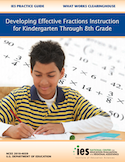Fractions
Explore resources designed to improve fractions instruction in elementary and middle school. 
- View a visual diagram of all four practices
- Watch a topic overview and download planning templates
- Listen to an expert
Explore the subtopics below to learn more about the recommended practices:
To learn more about the research underlying these practices, view the IES Practice Guide, Developing Effective Fractions Instruction for Kindergarten Through 8th Grade.
- Items 1 - 12 of 62
Sort by:
Making Sense of Computational Procedures
Fractions > Fractions Operations > Overview & Tools
Watch this multimedia overview to learn about the importance of focusing on conceptual understanding and procedural fluency with fractions operations and how they connect. The overview describes...
Resource Type
Overview
Recognizing Fractions as Numbers
Fractions > Fractions as Numbers > Overview & Tools
Watch this multimedia overview explaining why number lines are recommended as a central representational tool to teach students about fractions and how teachers can help students understand...
Resource Type
Overview
Developing Proportional Reasoning
Fractions > Ratio, Rate, Proportion > Overview & Tools
This multimedia overview offers an introduction to students’ development of proportional thinking and its relationship to cross-multiplication. It describes recommended instructional strategies for...
Resource Type
Overview
The Conceptual Basis for Fractions
Fractions > Fractions Concepts > Overview & Tools
This multimedia overview introduces how children’s intuitive understandings of sharing and proportion can serve as a foundation on which to build formal instruction of fraction concepts. This...
Resource Type
Overview
Developing Effective Fractions Instruction for K-8
Fractions > Overview & Tools
The National Mathematics Advisory Panel and the Common Core State Standards emphasize the importance of rational numbers. Watch this multimedia overview to learn why and to receive an introduction...
Resource Type
Overview
The Concepts Behind Operations
Fractions > Fractions Operations > Learn What Works
Dr. David C. Geary describes how to build students’ understanding of the concepts underlying operations with fractions, common misconceptions that children have, and what can be learned from their...
Resource Type
Expert Interview
Learning to Think Proportionally
Fractions > Ratio, Rate, Proportion > Learn What Works
Dr. James Lewis discusses what it means to think proportionally and offers examples from everyday contexts. He describes the conceptual progression toward working with cross-multiplication and...
Resource Type
Expert Interview
Ratio, Rate, Proportion Problems
Fractions > Ratio, Rate, Proportion > Learn What Works
Dr. Lewis demonstrates how to work through two examples of problems involving ratios. Related Files: Ratio, Rate, and Proportion Problems (Sample Material)
Resource Type
Expert Interview
Supporting Teachers' Conceptual Understanding
Fractions > Fractions Operations > Learn What Works
Listen to this interview with instructional facilitator Jonathan Wray as he describes how his district uses walk-throughs as one element of a multifaceted professional development plan for...
Resource Type
Expert Interview
A Teacher’s Perspective: How to Use the Practice Guide
Fractions > Fractions as Numbers > Learn What Works
Laurie Thompson served as a practitioner representative on the IES panel for teaching fractions. In this interview she describes how she first became aware of the importance of using a number line...
Resource Type
Expert Interview
Number Lines: A Key Representational Tool
Fractions > Fractions as Numbers > Learn What Works
Dr. Yukari Okamoto describes the misconceptions that students have about fractions and how to help them understand fractions’ place in the number system. She demonstrates instructional approaches...
Resource Type
Expert Interview
Building on Intuitive Understanding
Fractions > Fractions Concepts > Learn What Works
Dr. Thomas P. Carpenter discusses the importance of building children’s conceptual understanding of fractions based on intuitive ideas about sharing and apportioning objects. He demonstrates...
Resource Type
Expert Interview
















